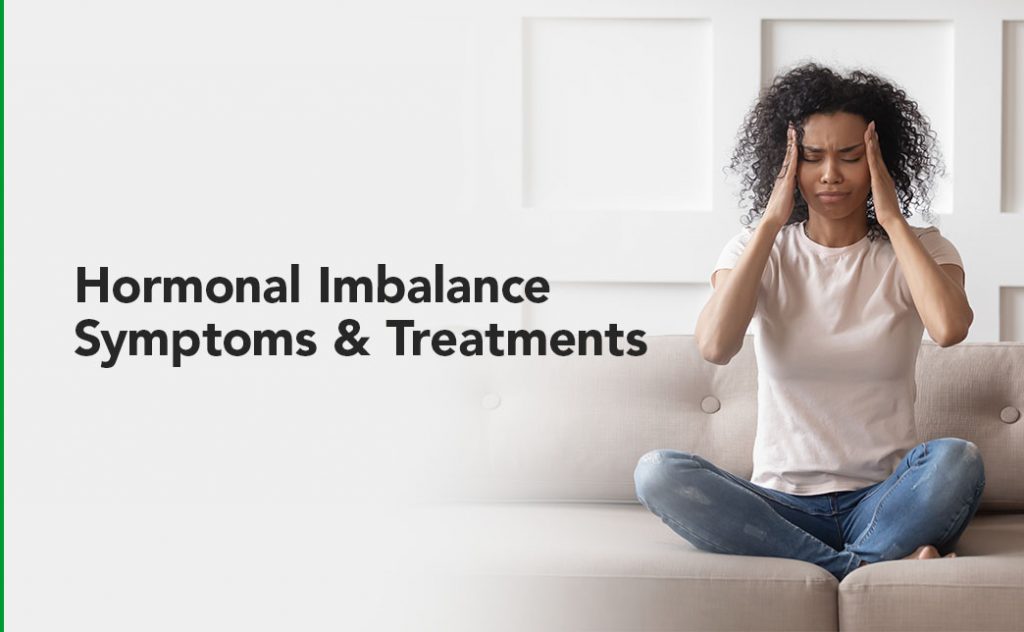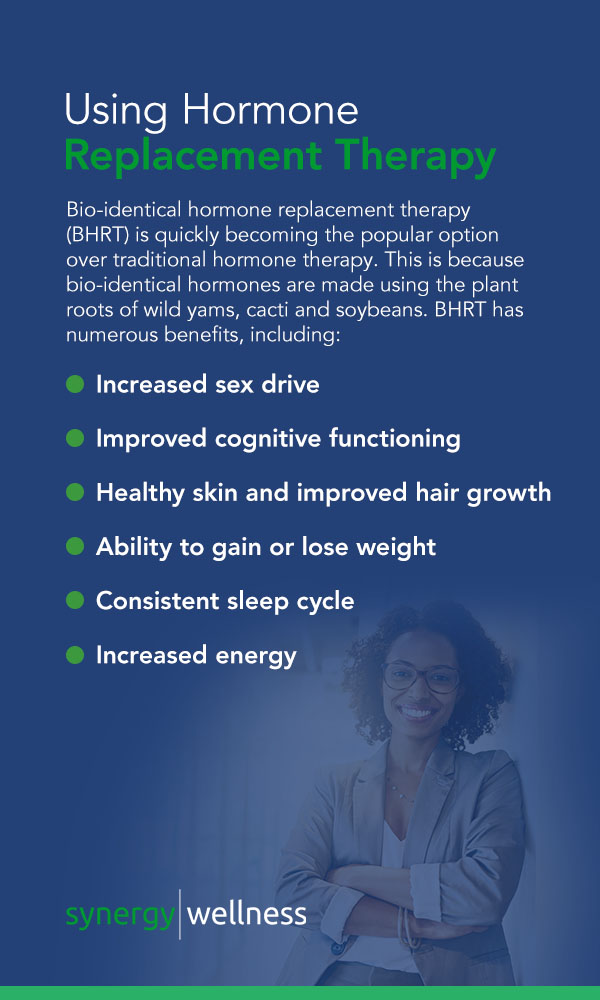
Hormones are vital to human life and control various bodily functions. Hormones are the body’s messengers that help different parts of the body communicate with one another. Endocrine glands are responsible for producing hormones at the proper levels. When our hormones are properly balanced, they regulate our metabolism, reproductive system, growth, mood and other essential systems. The hormones in our body have an impressive amount of power, and even a small change can significantly affect the way we feel and function.
Below, we’ll talk about what a hormone imbalance is, how the body reacts and how to bring your hormones to a normal range.
What Is a Hormone Imbalance?
The human body is a delicate ecosystem with a complex network of hormones. Our hormones are responsible for the proper regulation and function of our body’s various systems. They help our cells communicate with one another to carry out specific tasks, such as digestion and mood regulation. When the body produces too little or too much of any given hormone, this is referred to as a hormone imbalance. A hormonal system thrown off balance can disrupt essential functions in the body and lead to various symptoms.
When even just one hormone is off-balance, it can affect the rest of the hormones in the body and contribute to further complications or symptoms. Treating an imbalance is essential to preventing additional symptoms.

What Are General Signs of Hormone Imbalance?
The symptoms of a hormonal imbalance can look similar to one another, regardless of what hormone is in flux. It’s essential to ensure that your hormones are balanced properly, so your bodily functions perform as they should. There are some general signs you can look out for that might be an indication of a hormone imbalance, such as:
- Fatigue: It’s normal to be tired, but feeling fatigued frequently can signify something more serious. If you’re getting the right amount of sleep each night and have a healthy diet but still feel exhausted, you may be experiencing a hormone imbalance.
- Weight gain: People with a hormonal imbalance often struggle with weight gain. This is because the body might be producing too much cortisol, otherwise known as the stress hormone, and it triggers our body’s flight or fight response. When too much cortisol exists in the body for an extended period, the body will retain fat as an energy source to use in the event of perceived danger.
- Insomnia: Melatonin is the hormone responsible for regulating our sleep cycle and keeping us asleep throughout the night. If the body is unable to produce enough melatonin, a person might experience difficulty falling and staying asleep. A lack of a good night’s rest can impact the body in multiple other ways. Chronic sleep deprivation can lead to heart problems, an impaired immune system and depression.
- Mental health conditions: Anxiety and depression are among the most common mental health conditions in America. For some people, these conditions result from genetic or environmental influences. However, the sudden onset of anxiety or depression symptoms can indicate a hormone imbalance.
- Digestive problems: Hormones play a direct role in our digestive system, so when certain hormones are out of balance, they can impact the bacteria in the gut that break down food, causing symptoms such as constipation, bloating and nausea.
- Weakness or joint pain: Hormones help keep our muscles and joints strong. When hormones, such as estrogen and testosterone, are produced at lower levels in the body, there is sometimes a loss of strength and stiff muscles or joints.
- Acne and hair loss: As we go through puberty, acne is a common symptom for many teens as their hormones adjust. Plenty of older adults experience hair loss as they age. However, if you suddenly experience more acne breakouts than usual, it may signify that you have a hormonal imbalance. Sudden hair loss, brittle nails and dry skin can also be a sign that your hormones are in flux.
Any of these symptoms can affect either men or women. Hormonal imbalances can result from aging or other underlying medical conditions, so talking to your doctor about your symptoms is essential to rule out other causes.
Symptoms of Hormone Imbalance in Men
Men experience many of the general symptoms above due to a hormonal imbalance, including fatigue, weight gain, hair loss and loss of muscle mass. There are a few additional symptoms of hormonal changes that men experience due to a hormone imbalance. As men age, testosterone levels in the body slowly start to drop. Low levels of testosterone can cause various symptoms, such as loss of strength, memory problems and a low sex drive. Low libido can cause additional anxiety in men around sex and create tension in intimate relationships.
Other hormones, such as prolactin, can cause erectile dysfunction at increased levels. Low testosterone can also be linked to erectile dysfunction, but it’s typically rare. Like low libido, erectile dysfunction can cause anxiety and impact confidence, which can contribute to mood swings associated with the anxiety and depression caused by a hormonal imbalance. When men’s hormones change, they sometimes also feel a lower sense of well-being when their testosterone levels fluctuate.
Symptoms of Hormone Imbalance in Women
Women can experience the general symptoms of hormone imbalance, but on top of this, women have the potential to face additional symptoms, especially as they get older.
Menopause typically starts 12 months after a woman has experienced her last period. During this time, women produce certain hormones less than they did before. Various symptoms may begin to appear, such as night sweats, hot flashes, weight gain or trouble sleeping. Menopause will affect every woman at a different point in her life but typically begins between 45 and 55.
Another symptom of a hormonal imbalance in women is irregular periods. Sometimes, this is because of a condition called polycystic ovary syndrome (PCOS), which is when women produce more male hormones than usual. Irregular periods are just one symptom of PCOS, but women might also experience excess body hair, weight gain, low sex drive and acne outbreaks.
Mood swings are a common symptom among women with hormonal imbalances. These mood fluctuations can result from menopause or menstrual cycle changes, or they can signal a different kind of hormonal problem, such as a thyroid imbalance.
Additionally, women can experience infertility due to a hormone imbalance. This is because a hormone imbalance has a significant effect on the consistency of a menstrual cycle. A hormone imbalance makes periods and ovulation hard to track and creates difficulty for women trying to get pregnant.
What Are Some Causes of Hormone Imbalance?
Understanding the signs and symptoms can help you identify a hormonal imbalance sooner, but knowing the causes can help you pinpoint what hormones might be in flux and what you should tell your doctor. There are a few potential causes for a hormonal imbalance, including:
- Dietary habits: Hormones and nutrition have a unique link, and certain foods help our bodies create the hormones we need. When we’re not getting enough nutrients or eating unhealthy foods, our bodies can’t always produce the hormones we need, which can cause an imbalance. Certain eating disorders, such as anorexia, can also cause a fluctuation in the body’s hormone levels.
- Hyperthyroidism: This is a condition where your thyroid produces an excess of thyroxine hormone. Hyperthyroidism impacts the speed of the body’s metabolism. People with this condition often experience unintentional weight loss as a result. Some of the other symptoms include irritability, sweating and a rapid heartbeat. People with hyperthyroidism are treated with medications that help block the production of excess hormones and rebalance the hormones in the body.
- Disrupted sleep: When you’re not getting enough sleep each night, your hormones may fluctuate more throughout the day, and you can start to experience some of the symptoms of a hormonal imbalance. Some of the ways your sleep can be disrupted include stress, excess noise, discomfort and blue light exposure before bed. Looking at a phone screen or device that emits blue light before bed can halt melatonin production and make it difficult to fall asleep.
- Endocrine glands: Your endocrine glands produce various types of hormones throughout the body. Endocrine disorders can impact the ability of these glands to produce hormones efficiently. This can create a hormonal imbalance in the body, and the type of hormonal imbalance will depend on which glands are impacted.
- Other underlying medical conditions: Some various other medical conditions and treatments can cause a hormonal imbalance, such as the presence of tumors, taking certain medications or cancer treatments. It’s essential to consult with your doctor, so they can run tests to rule out any additional conditions that could be causing a hormonal imbalance.
If you think you have a hormonal imbalance, it’s important to talk with your doctor about your symptoms and your current lifestyle. Receiving a diagnosis for a hormonal imbalance can help you get treatment so that you can improve your individual quality of living.

How Are Hormonal Imbalances Diagnosed?
A doctor will conduct a series of tests to determine whether or not you have a hormone imbalance. First, they will provide you with a questionnaire or ask you questions about the symptoms you’ve been experiencing. This will give them a better idea of what type of hormone imbalance to test for, especially since the symptoms can vary from person to person.
Your doctor will then give you a saliva, urine or blood test to determine your current hormone levels and rule out any other medical conditions that might be causing your symptoms. Blood tests are the best way to determine whether your hormone levels are within a normal range. Multiple blood tests may be given at different times because hormones can naturally fluctuate, particularly in women who have yet to experience menopause.
If your doctor finds that your hormone levels are too high or low, they can recommend treatment based on your individual needs. Specific hormone imbalances require different treatment methods, such as hormone replacement therapy (HRT), to bring balance to the hormones in your body.
How Can You Rebalance Your Hormones?
Balanced hormones are critical to the proper function of the body’s various systems. There are lifestyle changes you can make to help you rebalance your hormones and find relief, such as:
- Getting enough sleep: Sleep disturbances can affect how our hormones fluctuate throughout the day. Sleep disturbances can cause problems with appetite, weight gain and may even contribute to the development to type 2 diabetes. It’s essential to get at least six to eight hours of sleep a night to regulate your hormones. Blue light from cell phones and other devices can suppress melatonin secretion, disrupting the circadian rhythm.
- Eating a healthy diet: Nutrition impacts our hormones more than many people realize. For example, excess sugar can cause insulin resistance, which can lead to the development of type 2 diabetes. Eating healthy fats and plenty of fiber can help regulate hormones and promote gut health. A healthy diet can also help the body regulate insulin. Certain vitamins can help bring your hormone levels back to a normal range, such as probiotics or B vitamins. Your doctor can recommend specific vitamins for your individual needs to help bring your body back to balance.
- Regular exercise: Frequent exercise is already good for health overall, but it can also balance hormones that coordinate appetite. This can help manage the weight gain symptoms related to hormone imbalance. Consistent physical activity can also improve the body’s ability to produce and process insulin.
- Stress management: Excess stress increases cortisol and adrenaline levels in the body. When these hormones are elevated, they can cause weight gain, mood swings and potential heart problems. Practicing healthy coping mechanisms can help alleviate excess stress. Some of these coping mechanisms include yoga, mediation and listening to music.

Using Hormone Replacement Therapy
Hormone replacement therapy is one of the many treatment options available to people with a hormone imbalance. Bio-identical hormone replacement therapy (BHRT) is quickly becoming the popular option over traditional hormone therapy. This is because bio-identical hormones are made using the plant roots of wild yams, cacti and soybeans. BHRT has numerous benefits, including:
- Increased sex drive
- Improved cognitive functioning
- Healthy skin and improved hair growth
- Ability to gain or lose weight
- Consistent sleep cycle
- Increased energy
If your doctor determines that you have a hormone imbalance, they may choose to administer BHRT to help regulate your hormones. BHRT can be delivered in various methods, including pills, creams, injections or pellets. Pellets are placed under the skin and release hormones into the body over a period of time. You can start to feel some improvement in two to three weeks and the full effect around two months, though results will vary from person to person.
Learn More About Bio-Identical Hormone Therapy in Bakersfield, CA
Hormones are the messengers in our bodies that help facilitate our various bodily functions. BHRT can help alleviate the symptoms of hormone imbalance and improve your quality of life. At Synergy Wellness Center, our BHRT treatments help prevent age-related symptoms so you can look and feel younger. We also offer other hormone treatments to help you manage the symptoms of hormone imbalance.
The positive effects of hormone therapy can significantly improve your life. Get in contact with us today to schedule an appointment or speak with a representative.




